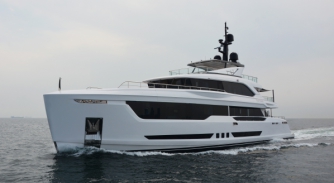Yacht purchase, sale and ship mortgages in Türkiye
CBC Law explain the legalities of Turkish yacht transactions…

Authors: Kemal Altuğ Özgün, Managing Partner, Ayşenur Köse, Associate, and Emire Özeyranlı, Legal Trainee, of CBC Law.
In this comprehensive article, we address various legal issues related to yachts, examining their legal nature, and then discussing the processes involved in negotiating and finalising yacht sales contracts. We also shed light on the essential documents that should accompany such contracts and, finally, delve into the role of ship mortgages in the context of yacht transactions.
Our country, embraced by vast seas, offers countless experiences for yachting enthusiasts, especially from the tranquil coasts of the Aegean to the bustling ports of the Mediterranean. However, alongside the allure of these unique environments, the inherent legal complexities of yacht transactions should not be overlooked. Typically defined as luxurious, large vessels designed for specific purposes, yachts can serve both private and commercial functions. In this context, it is crucial to thoroughly understand the complex legal regulations governing the purchase, sale and use of yachts.
One of the most important tools used for financing in yacht transactions is the ship mortgage, given that yachts are often the most valuable asset an owner can offer as collateral to meet financial needs.
This article will discuss the concept and legal nature of yachts, yacht sales contracts and their formation, the documents required to accompany a yacht sales contract, and finally, ship mortgages.
The concept and legal nature of yachts
Yachts, which can vary widely in structure and size, are generally designed to offer a comfortable living space. The concept of yachts in our law was first addressed in the Turkish International Ship Registry Act No. 4490, dated 16 December, 1999, and the amendment to the Decree Law No. 491 (“Law”). According to the relevant Law, yachts are defined as “marine vessels built in the style of a yacht, used for leisure and sports purposes, carrying no more than thirty-six yachtsmen, not classified as cargo or passenger ships, registered in the inventories of tourism companies, and designated as ‘Commercial Yacht’ in tonnage documents.” In the Marine Tourism Regulation, yachts are defined as “marine vessels suitable for use in marine tourism for leisure, sports and entertainment purposes, carrying no more than twelve passengers, not classified as cargo, passenger or fishing ships, equipped with cabins, toilets and kitchens”, without distinguishing between commercial/private yachts.
Although the Turkish Commercial Code (“TCC”) defines the concept of a ship, it does not specifically define yachts. It is possible to conclude that yachts fall under the definition of ships in Article 931/1 of the TCC. Indeed, Article 935/2 of the TCC lists the types of ships to which certain provisions of the TCC apply, including the term “yacht”, indicating that yachts can be considered ships by their nature. According to Article 936 of the TCC, all ships, whether registered or not, are considered movable property, and thus yachts can also be considered movable property. Therefore, yachts, being ships, can be regarded as movable property capable of changing location through external power or their own movement.
Additionally, yachts classified as ships and used for commercial purposes are considered commercial yachts and thus commercial vessels. The provisions of the TCC concerning maritime commerce apply to commercial yachts, except for the provisions to the contrary in Article 935/1 of the TCC. Private yachts not used for commercial purposes are subject to separate regulations, with the TCC provisions applicable to private yachts listed in Article 935/2-a of the TCC.
Although yachts are considered movable property due to their nature as ships, they may be subject to real property ownership provisions in certain exceptional situations. Article 937 of the TCC outlines these exceptional situations where the provisions concerning real property apply to yachts, including ships.
Yacht sales contracts
In recent years, Türkiye’s yacht sector has rapidly developed and gained importance, with the country’s long coastline and strategic location offering significant potential for yacht manufacturing and sales. The sector’s growth and development have resulted in an increase in yacht manufacturing and sales, leading to more complex and diverse contract structures.
Legal framework in Türkiye
There is no specific regulation concerning yacht sales contracts in Turkish legislation. Therefore, the general provisions related to sales contracts and movable sales in the Turkish Code of Obligations ("TCO") apply. Given the special provisions and economic value of yacht sales contracts, they can be considered a special type of sales contract.
Practice of yacht sales contracts
In practice, yacht sales contracts are generally categorised into two types. The first category involves contracts for the sale of newly built and unused yachts (sale of new builds). The second category involves contracts for the sale of used yachts, known as “sale of secondhand yachts”. The provisions in the sales contract are determined based on whether the yacht is secondhand or not.
Although standard contracts are frequently used in yacht transactions, it is possible to add special provisions to the standard contract based on the parties’ specific requirements, the documents required by the Flag state and payment methods. Additionally, an additional contract can be prepared alongside the standard contract to complete the yacht purchase and sale procedures.
Formation of yacht sales contracts
The formation process of a yacht sales contract begins with offers and acceptances between the parties. Negotiations are often conducted through brokers who facilitate the meeting of the buyer and seller and provide services for yacht sales and rentals. A yacht sales contract is established when one party’s offer is accepted by the other.
In yacht sales, the seller’s primary obligation is to transfer the possession and ownership of the yacht, while the buyer’s primary obligation is to pay the sale price and take delivery of the yacht. Yachts in Türkiye can be registered in national registries such as the National Ship Registry, the Registry for Ships Under Construction, and the Turkish International Ship Registry (“TUGS”). However, only commercial yachts can be registered in TUGS.
As a general rule, the validity of a movable sales contract for yachts is not subject to any formal requirements. However, the parties may agree to execute the contract in a specific form.
Documents required to be delivered by the parties
The documents that the parties are required to deliver in yacht sales contracts can be determined by mutual agreement. These documents are typically added to the standard contracts and referred to as “Addendum One”.
The most important document that the seller must deliver is the “Bill of Sale”, which indicates the transfer of ownership of the yacht from the current owner to another party. The Bill of Sale, usually prepared using standard forms, certifies that the seller has the authority to transfer ownership of the yacht, that the yacht is free from encumbrances and that there are no outstanding tax liabilities. In Turkish law and other legal systems, the Bill of Sale must be signed by both the seller and the buyer. This document represents the agreement on the transfer of ownership.
The delivery of the yacht occurs at the agreed time and place between the parties and is documented by signing the “Delivery and Acceptance Protocol”. This protocol records the transfer of possession of the yacht.
The concept of ship mortgages
A ship mortgage is a limited real right that can be established on a registered ship or a share of a ship to secure an existing debt, allowing the creditor to sell the ship and satisfy the debt if it is not paid. The primary provisions governing ship mortgages are stipulated in the TCC, and in matters not covered by the TCC, the provisions of the Turkish Civil Code (“TCC”) regarding real estate mortgages apply.
The ability of ships to move quickly and enter different legal jurisdictions necessitates the regulation of ship mortgages at an international level. Consequently, there are numerous international agreements concerning limited real rights on ships. Türkiye is a party to various international agreements on ship mortgages and has incorporated these agreements into national laws through reference or incorporation to ensure compliance with international regulations.
Since ship mortgages do not require delivery, they are regulated differently from other types of movable pledges in our legislation. This special regulation emerged to facilitate the large amounts of financing needed for the construction, repair or operation of ships. In ship mortgages, the agreement between the parties and the registration of the mortgage without the need for the ship’s delivery is seen as a suitable solution to meet the needs of ship operations.
Scope of ship mortgages
Ship mortgages cover registered ships. Provided they are registered, different types of ships, including commercial vessels, special-purpose ships, recreational and sports boats, scientific research and training ships, can be subject to ship mortgages. Article 1015 of the TCC regulates the establishment of contractual ship mortgages. According to the provision, a ship mortgage is established by an agreement between the parties and the registration of the mortgage in the ship registry. For the agreement to be valid, it must be in writing, and the signatures must be notarised. The mortgage agreement can also be executed at the ship registry office.
In ships subject to co-ownership, each co-owner can establish a ship mortgage on their share. However, if all shares of the ship are held by the same owner, separate mortgages on separate shares cannot be established according to Article 1014/4 of the TCC. If joint ownership is involved, since there is no specific provision on this matter, Article 857 of the TCC is applied by analogy, and a mortgage on the entire ship can be established with the consent of all owners.
Conclusion
To ensure sustainable growth in yachting, an essential part of our maritime sector, there is a need for reliable financial mechanisms and effective regulations both domestically and internationally. In this context, ship mortgages emerge as a suitable tool to meet this need in practice.
Although yachts are generally considered movable property, in certain exceptional cases, they may be subject to real property ownership provisions. This situation requires careful handling of yacht purchase and sale processes, even when conducted through standard contracts. Additionally, considering that ship mortgages, which provide financing opportunities, are subject to both local and international regulations, it is essential that these transactions are meticulously carried out under the guidance of experienced legal professionals.
NEW: Sign up for SuperyachtNewsweek!
Get the latest weekly news, in-depth reports, intelligence, and strategic insights, delivered directly from The Superyacht Group's editors and market analysts.
Stay at the forefront of the superyacht industry with SuperyachtNewsweek
Click here to become part of The Superyacht Group community, and join us in our mission to make this industry accessible to all, and prosperous for the long-term. We are offering access to the superyacht industry’s most comprehensive and longstanding archive of business-critical information, as well as a comprehensive, real-time superyacht fleet database, for just £10 per month, because we are One Industry with One Mission. Sign up here.
Related news

Damen Yachting launches Five Oceans
The second Yacht Support 53 has hit the water at Damen Yachting's Antalya shipyard
Fleet

Turkish industry continues to rise
Bogdan Gusarev dissects the key takeaways from the first Superyacht Summit Türkiye as the nation looks to solidify its shipbuilding reputation
Business

Cautious optimism: The lawyer’s view
Guest Author Will MacLachlan, Partner at HWF, takes a look at the state of the current sale and purchase market and the availability of yacht finance
Owner

ARES Shipyard launches into yachting
The Turkish boatbuilder has announced the official launch of ARES Yachts at the Monaco Yacht Show 2023
Crew

Mengi Yay delivers Reverie
The Turkish shipyard has completed the delivery of the latest yacht from its Virtus series
Fleet
Related news
Damen Yachting launches Five Oceans
1 year ago
Turkish industry continues to rise
1 year ago
Cautious optimism: The lawyer’s view
1 year ago
ARES Shipyard launches into yachting
2 years ago
Mengi Yay delivers Reverie
2 years ago
NEW: Sign up for
SuperyachtNewsweek!
Get the latest weekly news, in-depth reports, intelligence, and strategic insights, delivered directly from The Superyacht Group's editors and market analysts.
Stay at the forefront of the superyacht industry with SuperyachtNewsweek



